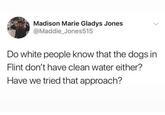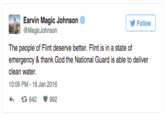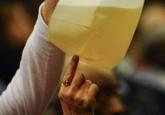Overview
The Flint Water Crisis is an ongoing situation in the city of Flint, Michigan, where government mismanagement of the water supply led to dangerous conditions, including prolonged lead contamination and deadly outbreaks of Legionnaires Disease. The crisis was met with relative national indifference until online activists forced the media and government to pay attention to the situation.
Background
In April 2014, the city of Flint changed its water source from Detroit municipal water to the nearby Flint River. While the river had been the city's backup water source for a long time, it had never been used; instead, for the past fifty years, Flint had purchased treated water from Detroit. However, the city, which had long been decreasing in population and industry, was looking to save about $5 million per year by joining another water distribution network, which had not yet been built.[1]
In January 2015, residents at a town hall meeting in Flint complained about the new water's smell, taste, and appearance, which was often murky and yellowish. The Michigan Department of Water Quality maintained at that time that the water was safe to drink, however local opposition to that fact continued to grow. The Flint Water Department published the results of tests claiming that the water was safe in early 2015, but it was later found that the tests had been performed in houses that did not have lead plumbing.[2]
In August, 2015, the citizens of Flint submitted a petition with over 26,000 signatures to the city, demanding that something be done about the water. In September, a doctor named Marc Edwards began testing residents for lead in their blood, and found that at least a quarter of Flint households have levels of lead above the federally acceptable level of 15 parts per billion (ppb) and that in some homes, lead levels were at 13,200 ppb. The cause was found to be corrosive elements in the water coming from the Flint River; the water caused lead to leach from older pipes. Anyone who drank the water in Flint between April 2014 and the current day has most likely been exposed to higher levels of lead than are necessary to not be considered poisonous; somewhere between 6,000 and 12,000 residents have suffered detrimental health effects as a result, and many children were exposed. In addition, an outbreak of Legionnaire's Disease, a waterborne illness possibly linked to the contamination, killed 10 people and sickened 77 others.[1]
Notable Developments
State of Emergency Declaration & Email Release
After a dedicated outpouring of social media over the water crisis, the Governor of Michigan, Rick Snyder, declared a state of emergency in the city on January 5th, 2016.[2] On January 12th, he mobilized the National Guard to begin distributing bottled water to residents. A Federal emergency was declared on January 16th, allowing for FEMA to dedicate resources to assisting residents. On January 19th, 2016, Snyder released all his emails pertaining to the crisis, although many were deeply redacted.[4] However, the emails still showed that Snyder had known about the extent of the crisis and neglected to step in. Several anti-Snyder hashtags went into wide use on Twitter, including #ArrestGovSnyder.[5]
Celebrity Calls for Intervention
As it became more obvious in late 2015 that the administration of Michigan was acting negligently in the case of Flint, social media outcries, often using the hashtag #FlintWaterCrisis, became more frequent, and included many celebrities who were appalled at the treatment of the city. On December 20th, filmmaker Michael Moore, who is originally from Flint, tweeted "This is a racial killing. Flint MI is 60% black. When u knowingly poison a black city, u r committing a version of genocide #ArrestGovSnyder"[7] This tweet, which had over 1,400 retweets and 1,100 favorites helped to activate many of the people involved in the Black Lives Matter, like active tweeters Deray McKesson and Shaun King. Other celebrities, like Sean Combs, Meek Mill, Jim Gaffigan, Sandra Bernhard, and Magic Johnson also tweeted about the crisis, amplifying it in the public eye.[8]
During January 16th's Democratic Presidential Debate, both Bernie Sanders and Hillary Clinton spoke about the actions they'd taken when they learned about Flint's issues. Bernie Sanders re-emphasized his prior call for Governor Rick Snyder's resignation.
Search Interest
External References
[1] Wikipedia – Flint Water Crisis
[2] USA Today – How water crisis in Flint, Mich., became federal state of emergency
[3] NYTimes – As Water Problems Grew, Officials Belittled Complaints From Flint
[4] Gawker – Finally, We Know Exactly What Led to the Flint Water Crisis
[5] Twitter – #ArrestGovSnyder
[6] Twitter – #FlintWaterCrisis
[7] Twitter – Michael Moore's Tweet
[8] Fortune Magazine – Celebrities Are Speaking Out About the Flint Water Crisis











Comments ( 54 )
Sorry, but you must activate your account to post a comment.
Please check your email for your activation code.